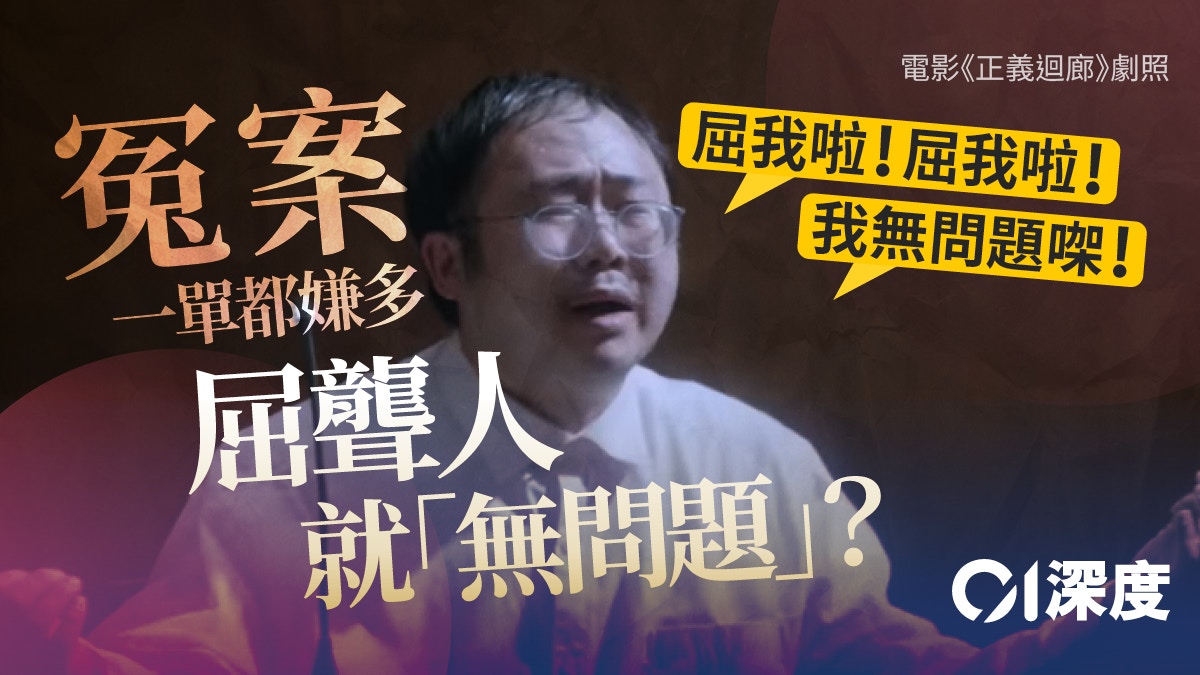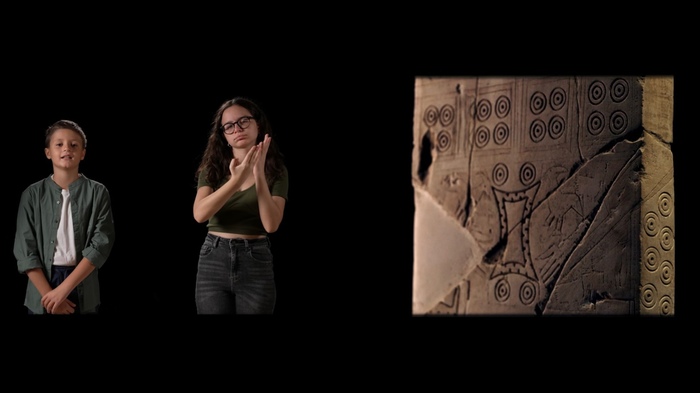In court, the difference of a few words in the testimony is enough to lead to unjust imprisonment, especially for the deaf and hearing-impaired, who are more likely to make big mistakes because of poor communication.
In 2019, Luo Zhenjie, a hearing-impaired teenager, assaulted the police precisely because he misheard and answered wrong questions, and was convicted of a crime, which caused psychological trauma.
The Equal Opportunity Commission issued the "Judicial Equality for the Deaf and Healthy" guidelines last Tuesday (November 15), aiming to protect the basic rights of the deaf and hearing-impaired; Improvement suggestions to remove barriers caused by misunderstanding and miscommunication.
Can this "Guideline" make up for it and prevent similar miscarriages from happening again?
In addition to the judicial process, what places and processes need to be supplemented to fully protect the rights of the deaf and hearing-impaired to receive a fair trial?
In recent years, deaf and hearing-impaired persons have suffered from unfair prosecutions because they did not receive proper support.
Can the EOC's "Judicial Equality for the Deaf and Affected" be a remedy?
"Impulse" mistakenly changed to "hitting the police on impulse"
Over 300,000 people in Hong Kong suffer from hearing difficulties.
According to the 2020 survey conducted by the Census and Statistics Department, about 266,900 people in Hong Kong reported slight hearing difficulties, 44,300 people had great hearing difficulties, and another 3,600 people were completely deaf.
Among the latter two, only 24% and 9.3% said they used hearing aids or cochlear implants respectively, while 3,000 people used sign language for daily communication.
These 47,900 people seem to be only a small number, but when they unfortunately fall into judicial proceedings, and the judiciary does not have a comprehensive support system and translation system, they may not be able to obtain a fair trial.
The case of the hearing-impaired teenager Luo Zhenjie assaulting the police just revealed the seriousness of the lack of system.
Luo Zhenjie, who is severely hearing-impaired, was originally charged with attacking former Senior Superintendent District Wing Leung in Causeway Bay in 2019.
During the trial, Luo Zhenjie could not accurately understand the questions and confessions in court because the hearing aids "overlapped" the earphones provided by the court, and because the interpreter was wearing a mask and could not read his lips.
When the court quoted his statement after his arrest that he was "impulsive, sorry sir, give me a second chance", the magistrate Zheng Jihang asked the defense representative lawyer whether the sentence should be "hit the police on impulse", and the representative lawyer wrongly agreed Luo Zhenjie did not refute this statement.
When Luo Zhenjie was asked similar questions by the prosecution, or because he could not hear the question clearly, he wrongly agreed to the facts of the case.
Luo Zhenjie was initially convicted of assaulting the police and sentenced to a rehabilitation center; later, he successfully appealed. Judge Zhang Huiling of the Court of Appeal pointed out that the defense lawyer, the victim and the magistrate made mistakes because the appellant may not have fully followed the content of the trial.
The case was remanded for retrial and was brought up at the Eastern District Magistrates' Court at the end of last month, and a scribe was arranged to summarize the content of the hearing immediately for the defendant to review.
But regardless of the outcome of the interrogation, Luo Zhenjie's seven-week sentence in the rehabilitation center is irreversible.
Luo Zhenjie, who is severely hearing-impaired, was charged with assaulting the police in 2019 and was eventually convicted.
However, the Court of Appeal revealed that the three parties made mistakes, and the case was sent for retrial.
(Photo by Lu Leqian)
EOC seeks to ensure judicial equality for the deaf
In order to protect the right of the deaf and hearing-impaired to a fair trial, the Equal Opportunities Commission (Equal Opportunities Commission) last Wednesday (November 15) published "Judicial Equality for the Deaf: A Reference for Persons with Disabilities, Legal Workers, and Those Participating in Judicial Procedures" "Guidelines" ("Guidelines").
The EOC pointed out that the Directives provide guidelines for courts to communicate with deaf and hearing-impaired persons, and propose facilitation measures and improvement suggestions for different litigation processes.
Dr. Zhu Chongwen, Executive Director (Operation) of the EOC, said in particular: "We firmly believe that people with disabilities should enjoy equal rights in the face of the law and can effectively seek justice."
Since there is no unified sign language standard in Hong Kong, and there are differences in the expressive ability and language proficiency of the deaf and hearing-impaired, they may not be able to understand each other's sign language and complex legal terms, which may lead to poor communication during the interrogation process.
The "Guidelines" provides suggestions from five aspects, including clarifying the differences between different degrees of deaf and hearing-impaired persons, communication precautions and general principles, commonly used auxiliary tools and services, common misunderstandings, and suggestions to promote effective communication between parties to the litigation.
Most importantly, the "Guidelines" try to break the stereotypes of deaf and hearing-impaired people in many societies, including: wearing a hearing aid does not mean hearing; not all deaf and hearing-impaired people can sign language, and 47,900 people with hearing difficulties Only 3,000 people can use sign language; the court only provides sign language interpretation services to the deaf and hard of hearing, which is not enough to ensure smooth communication between the two parties.
The "Guidelines" believe that the judiciary needs to prepare various forms of auxiliary services and technologies according to the hearing level, expressive ability and language level of the deaf and hard-of-hearing, such as pen-and-paper interpretation, listening aids, instant captioners, sign language Interpreters and oral lip-reading interpreters; and before starting judicial proceedings, to ensure smooth communication with the victim.
The "Guidelines" also remind courts and judicial personnel not to require sign language interpreters to explain, deliberate, or explain what the deaf and hearing-impaired said, so as to avoid interpreters deliberately guiding and misleading the communication between judicial personnel and the victim.
However, as soon as the "Guidelines" were released, they drew criticism from civil society groups.
For example, Shao Rizan, the founder of "Long Er", who has been concerned about the judicial rights of the deaf and hearing-impaired for a long time, questioned that the "Guidelines" are not legally effective and will not help to improve the judicial interpretation system. "Unfair judgments cannot be prevented, and judicial The issue of interpretation is very important, it concerns whether there will be wrongful cases.”
The EOC held a press conference on November 15 to announce the "Guidelines". The most important thing is to break the stereotypes of deaf and hearing-impaired people in many societies and provide a number of guidance and suggestions for communicating with them.
Can "believe" alone solve the problem?
These doubts are by no means unfounded.
Just imagine that last year, the seven magistrates’ courts handled as many as 148,282 cases, with an average of 58 cases per day per court—under such a heavy workload and limited time, a non-binding proposal document, It is really difficult to ensure that the judiciary is willing to spend one to two times more time on a single case than ordinary cases on pre-arrangement of communication tools and equipment and confirming that the communication between the deaf and hearing-impaired and judicial personnel is correct.
Zhu Chongwen said at the EOC press conference: "These materials ("Guidelines") enable them to recognize possible barriers to communication and suggestions to eliminate these barriers. I believe that the judiciary has the ability to recognize the rights of the deaf."
If "belief" is useful, society may no longer need laws.
After reviewing the information, the EOC actually has the right to formulate a legally binding "Code of Practice"—that is, to assist organizations to formulate policies and procedures to prevent and eliminate disability discrimination, and to make the organization's service behavior comply with the "Disability Discrimination Ordinance" ("Ordinance") ) provisions.
Although the person involved will not be prosecuted for failing to comply with the Code of Practice, failure to implement the recommendations contained in the Code of Practice will result in testifying in court.
The EOC has also issued a number of "Code of Practice" accordingly, including the "Code of Practice for Education" and the "Code of Practice for Employees".
This inevitably raises doubts. The deaf and hearing-impaired persons are also covered by the Ordinance. Why did the EOC not formulate a "Code of Practice" to protect their rights and interests?
The EOC explained in response to the inquiry of "Hong Kong 01" that the "Code of Practice" issued in the past was to provide a more detailed explanation of the concepts and application principles of the complex provisions of the anti-discrimination ordinance through cases (including local cases and cases related to other common law countries). Explanation; and the purpose of the EOC to formulate the "Judicial Equality for the Deaf and Healthy" guidelines is to propose specific operational guidelines for effective communication between parties involved in the judicial process and the deaf and hearing-impaired persons. It is not an interpretation of legal provisions , so it is more appropriate to provide advice in the form of "guidelines".
Shao Rizan questioned that the "Guidelines" are not legally binding and will not help improve the judicial interpretation system.
(Photo by Ou Jiale)
Law enforcement also has communication issues
Another question raised by the society about the "Guidelines" is that it only focuses on judicial procedures, but does not take into account the obstacles and difficulties that law enforcement agencies will encounter when communicating with the deaf and hearing-impaired.
For example, in the criminal damage case of deaf Zhang Zhongjie in 2019, Zhang Zhongjie had a dispute with his friend and damaged his friend's bucket during the period, so he was charged with criminal damage.
Zhang Zhongjie pointed out that during the police arrest and investigation, the sign language interpreter refused his request to seek the assistance of a lawyer and other sign language interpreters, distorted his meaning when recording his statement, pleaded for his guilt by talking to himself, and even pleaded for mercy outside the court. Instigate him to plead guilty.
The police never provided other auxiliary tools to record the statement, nor did they record the sign language translation process, which made Zhang Zhongjie unable to "reverse the case", and the case finally fell into the dark.
However, Item 3d of Chapter 45 "Charge Sheets and Court Procedures" of the "Police General Regulations Available for Public Inspection" states that "it is confirmed that the accused has understood the content of the charge, and then a warning is given to the accused, and if necessary, Use an interpreter, and make sure that the defendant understands the content of the charges”; Chapter 49, “Persons Detained by the Police”, Item 22 also states that in order to protect the rights of “detainees with special needs” including deaf and blind, Police officers must search such persons in a considerate, practical and reasonable manner.
Unfortunately, the above provisions do not provide specific guidelines and arrangements for the different steps of the criminal procedure, including warning, arrest, detention, investigation, and recording of statements.
Even though the "Training Matters" of the "Judicial Equality for the Deaf" guideline mentions that "where practicable, training may be provided to lawyers, legal aid officers, police officers and persons with disabilities", including the introduction of sign language interpretation and other available aids. tools and services, as well as providing sensitivity training by NGOs or organizations of the disabled on how to communicate effectively with the deaf and hard of hearing, etc. – but one can’t help but wonder what is “where feasible "?
And if the situation is "not feasible", don't these trainings need to be done?
In the past, it was not uncommon for deaf people to encounter difficulties in judiciary, law enforcement, or public services, but the "Guidelines" did not cover law enforcement procedures.
(Photographed by Zheng Zifeng/The picture is not the person involved)
"The public reports that the problem is serious" to solve it
When asked why he did not formulate relevant guidelines for law enforcement agencies such as the Police Force and the Correctional Services Department, Zhu Chongwen responded at the press conference: "The industry and people with disabilities reported that there are problems, so we have produced a guideline... This time we focus on the judicial process. If the industry and the public report to us that the problem is serious, we don’t rule out writing about it in the future. But at this stage, we don’t see the need. If there is a need, we will write again. There are many priorities to consider, and this time We put it in the judicial process.”
However, the incidents of deaf and hearing-impaired people being unfairly enforced have long been reported by the media. In addition to the above-mentioned Zhang Zhongjie criminal damage case, there is also the attack on the deaf-mute Ma Xueli in 2020. The opponent was shot, but the opponent overreacted and was injured, and the horse was sued to the "court".
From this point of view, the EOC has not produced guidelines for police officers in response to these cases.
The EOC's response of "solve problems only when there are problems" also reveals their thinking mode of "working according to the rules", and they do not understand that law enforcement procedures and judicial procedures are originally one.
For example, before the person involved is brought before the magistrate to respond to the prosecution, the police need to carry out a series of law enforcement and evidence collection procedures to judge whether there is enough evidence to prosecute, and the evidence considered by the judge is derived from the preliminary work of the police .
If the police fail to provide appropriate support to persons with disabilities during the investigation and collection of evidence, and even misinterpret the evidence, how to ensure that the subsequent judicial procedures will not be affected?
"Hong Kong 01" asked Zheng Yongshun, a member of the Legislative Council of the Democratic Alliance for the Betterment of Hong Kong, who is also a member of the Equal Opportunity Governance Committee, whether he would follow up on the incident. He expressed his support and welcome to the "Guidelines", which can strengthen the protection of hearing-impaired people and hope that the courts will adopt them widely. And make a review after a period of implementation.
In addition, he also hopes that when the court encounters operational problems when implementing the new guidelines, it should listen to the opinions of organizations concerned with hearing-impaired persons and consult the EOC.
He is particularly concerned that effective and accurate sign language interpretation must be provided when courts deal with hearing-impaired testimonies in the future, which is extremely important for hearing-impaired people.









/cloudfront-eu-central-1.images.arcpublishing.com/prisa/2C5HI6YHNFHDLJSBNWHOIAS2AE.jpeg)



